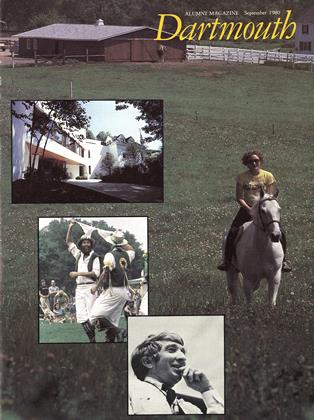James A. Donovan '39, ed. U. S. Military Force 1980: An Evaluation. Center for Defense Information, 1980. 96 pp. An indepth analysis, quantitative and qualitative, of all aspects of our present military might, nuclear and conventional, which attempts to answer a crucial question: "How much military force is enough in light of the growing realities of the limits of military force as a means to achieve our national objectives?" The conclusion, in part: "Striving for military predominance and stimulating arms races are not the way... to uphold our position in the world.... The United States is sufficiently strong to lead the world by its example along the paths of arms limitations, arms control, reduction of forces, strategic restraint and the furtherance of human rights including the right to live free of wars and fear of nuclear destruction." The Center for Defense Information is a project of the Fund for Peace.
David L. Sills '42, ed. Biographical Supplement of the International Encyclopedia of theSocial Sciences. Macmillan, 1979. 768 pp. An important update to the authoritative IESS and a significant reference work in its own right, since the volume contains biographies of 215 major 20th-century figures in all the social sciences. Each signed essay, written by a leading scholar in the field, includes not only the relevant biographical data but also a discussion of the formative influences on the subject's thought, an account of his or her influence on students and colleagues, a critical appraisal of the subject's work, and an assessment of his or her contribution to the social sciences. Louis W. Goodman '64 contributed the article on Robert F. Winick. Sills, executive associate of the Social Science Research Council, edited the book, wrote the preface, and contributed the article on Paul F. Lazarsfeld.
Edwin Mansfield '50. Statistics for Businessand Economics: Methods and Applications. Norton, 1980. 580 pp. A new text flexibly designed for either one- or two-semester courses in statistics and for either undergraduates or graduate students in business administration, public administration, and economics. It differs from comparable texts in its emphasis on the practical applications of statistics and the inclusion of an unusually full and varied group of problems, case studies, problem sets, and other supple- mentary materials. Mansfield is professor of economics at University of Pennsylvania.
Michael Mooney '61. Names. Treacle Press, 1979. 60 pp. Ralph J. Fletcher Jr. '75. TheMagic Nest: Fertility Poems. Northwoods Press, 1980. 38 pp. Two first books that demonstrate both solid achievement and unusual promise. In his cycle of 30 lyric poems, Fletcher explores the paradoxical interrelationships between fertility and birth on the one hand and barrenness and death on the other. The cycle begins with fertility and ends with death, but the poems suggest that Fletcher shares something of the mystical insight of D. H. Lawrence: Though they seem antipodes, birth and death can also be seen to complete, indeed to require, each other. Mooney's book is a single, long story set in Caithness, at the northeasternmost tip of Scotland. Making skillful use of the ironies implicit in first-person narration, Mooney recounts the struggles among several interknit families of Scottish farmers and sheep herders and captures the essence of the land of Pentland Firth and the people it has spawned: spare, bleak, simple, and violent. Scottish dialectical speech aside Mooney avoids it almost completely the final effect is not unlike that of one of Hugh MacDiarmid's better stories. Mooney lived in Edinburgh for three years while pursuing graduate studies in English literature.
James Tatum, associate professor of classics. Apuleius and "The Golden Ass." Cornell, 1979. 199 pp. The first book-length study in English devoted entirely to The Golden Ass of Apuleius, a Latin novel of the second century A. D. and by common consent one of the great literary works of later classical antiquity. "My aim," writes Tatum, "is to show how The Golden can be related to Apuleius' other literary activities," and because "I hope to reach not only classicists but also those readers who may not be acquainted with the ancient novel, I have addressed the book to what is usually called the general reader." Thus, all Latin or Greek passages are quoted in English translation. Tatum analyzes the novel's literary coherence, its critical reputation through the ages, and the author's use of language. Three appendices contain texts which have been either difficult to obtain in English or never before published in English.
 View Full Issue
View Full Issue
More From This Issue
-
 Feature
FeatureThe Dartmouth Animal and The Hypermasculine Myth
September 1980 By Leonard L. Glass -
 Feature
FeatureMonitoring Nature's Big Blow-Up
September 1980 By Dan Nelson -
 Cover Story
Cover StoryHorsin' Around
September 1980 By Marsha Belford -
 Article
ArticleCombating the Crippler
September 1980 By D.M.N. -
 Article
ArticleColor, Charm, Whatever
September 1980 -
 Article
ArticleSteel Elected
September 1980
Article
-
 Article
ArticleGIFT TO THE SHATTUCK OBSERVATORY
November, 1912 -
 Article
ArticleWHO'S WHO IN THE FACULTY
April 1924 -
 Article
ArticleAlumni Council Elections
February 1946 -
 Article
ArticleFall Housing Adequate
JUNE 1973 -
 Article
ArticlePeter Vins '85: Sanguine Soviet dissident
June • 1985 By Dave Coburn -
 Article
ArticleCHICAGO ASSOCIATION
January, 1925 By Warren D. Bruner

